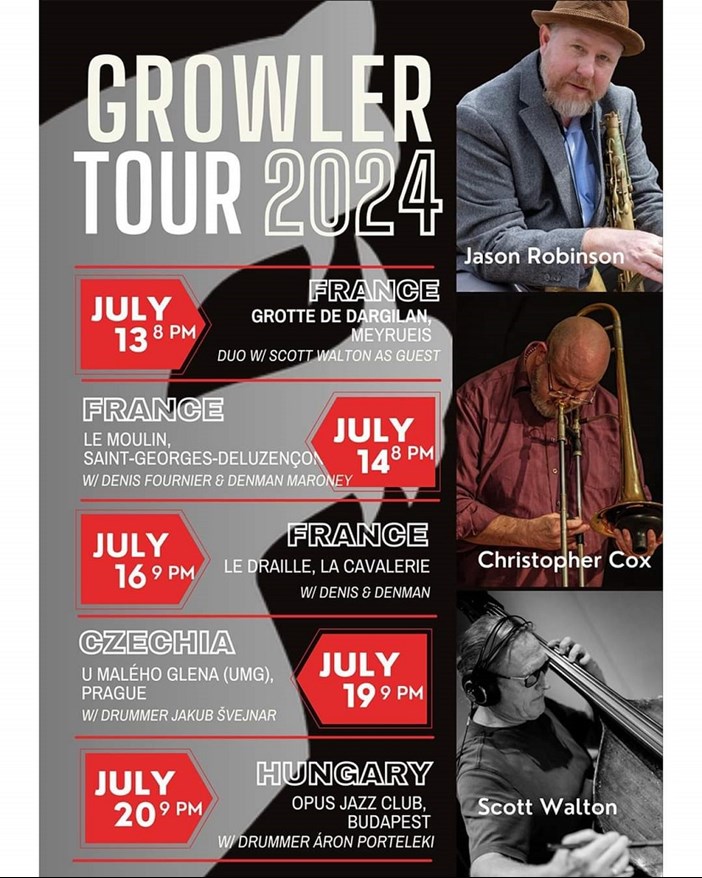Scott Walton
ACOUSTIC BASS / PIANO
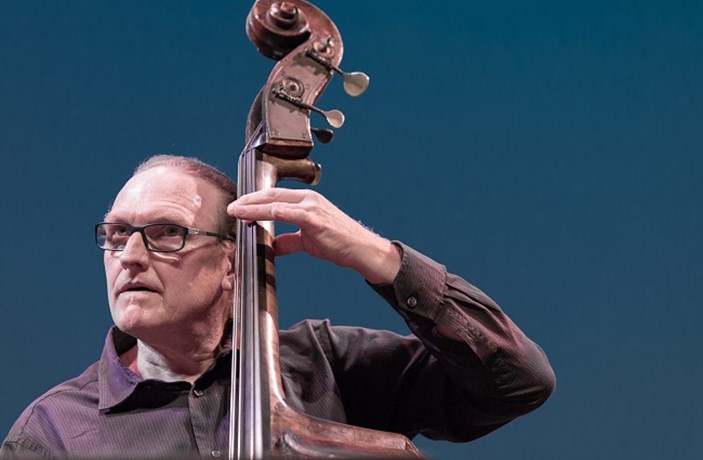
© Ernestine Lona
Scott Walton is a bassist and pianist whose music negotiates the terrain between jazz, free improvisation, and the classical avant-garde.
Active in a variety of ensembles, current projects include the Denman Maroney Quartet (with saxophonist/clarinetist Robin Fincker and drummer Samuel Sylvant), the Denis Fournier Trio (with Maroney), and a duo with violinist Guillaume Blanc.
Recent projects include duos with electronics musician Tim Perkis, lutinest Gilbert Isbin, and with saxophonist/flautist Steve Adams; Trio 3 with dancer Ellen Webb and singer Cecilia Engelhart, and the Michael Vlatkovich Quartet (with guitarist Tom McNalley and drummer Garth Powell).
Walton has performed or recorded with Alex Cline, Wadada Leo Smith, Vinny Golia, Myra Melford, Nels Cline, George Lewis, John Carter, and Bobby Bradford, among many others.
Gunther’s Grass - Ur (Titicacman, 2022)
Denman Maroney/Scott Walton/Denis Fournier - O Kosmos Meta (Rogueart, 2022)
Denman Maroney/Robin Fincker/Scott Walton/Samuel Silvant - Covid Variations (Self produced, 2021)
Larry Ochs/Aram Shelton Quartet - Continental Drift (Clean Feed, 2020) - Tracks 4 and 8
Mc 'N' Mac - Beautie On the Waters (Architecture,2018)
Glen Whitehead Trio - The Living Daylights (pfMentum, 2018)
Peter Kuhn, Alex Cline, Dave Sewlson, Scott Walton, Dan Clucas - Dependent Origination (fmr-records, 2017)
Alex Cline's Flower Garland Orchestra: Oceans of Vows (Cryptogramophone, 2017)
Vlatkovich/McNalley/Walton/Powell: Alone with Zero (2017)
Rova Orkestrova: No Favorites! (New World, 2016)
Tim Perkis/Scott Walton: Applied Cryptography (pfMENTUM 2016)
Steve Adams/Scott Walton: Cookies for Cyrano (pfMENTUM 2016)
Nathan Hubbard Skeleton Key Orchestra: Furiously Dreaming (Orenda, 2016)
Vlatkovich/Homler/Kaiser/Walton/West: Here & Here & Here (pfMENTUM 2014)
Nathan Hubbard - Encinitas and Everything After (Castor & Pollux, 2014)
Isbin/Walton: Recall (pfMENTUM 2014)
Alex Cline Ensemble: Continuation (Cryptogramophone, 2009)
Cosmologic: Eyes in the Back of My Head (Cuneiform, 2008)
Jason Robinson: Fingerprint (Circumvention, 2008)
Harris Eisenstadt: The All Seeing Eye + Octets (Poo-Bah, 2007)
Derek Keller: Impositions and Consequences (Tzadik, 2007)
Isbin/Gauthier/Walton: Venice Suite (Jazz'halo, 2006)
Trummerflora: Rubble 2 (Accretions, 2006)
Cosmologic: iii (Circumvention, 2005)
David Borgo: Ubuntu (Cadence Jazz Records, 2005)
Vinny Golia Quintet: One, Three, Two (Jazz'halo, 2004)
Trummerflora: Rubble 1 (Accretions, 2004)
Ellen Weller: Spirits, Little Dreams and Improvisations (Circumvention, 2004
Mark Applebaum: Martian Anthropology (Innova, 2004)
O'Keefe/Stanyek/Walton/Whitehead: Tunnel (Circumvention, 2003)
Nathan Hubbard: Skeleton Key Orchestra (Circumvention, 2003)
Cosmologic: Syntaxis (Circumvention, 2002)
Jeff Kaiser: 17 Themes for Ockodektet (pfMentum, 2002)
Anthony Davis: Tania (Koch, 2001)
Chris Chafe: Arcology (Centaur, 2001)
Cosmologic: Staring at the Sun (Circumvention, 2000)
O'Keefe/Stanyek/Walton/Whitehead: Unbalancing Act (9Winds, 1998)
Bertram Turetzky Tenors, Echoes, and Wolves (9Winds, 1997)
Octagon New Music Ensemble: Volume II (Albany, 1994)
Bobby Bradford: One Night Stand (Soul Note, 1989)
Jerry Coker: A Re-emergence (Revelation, 1983)
Carmell Jones: Returns (Revelation, 1982)
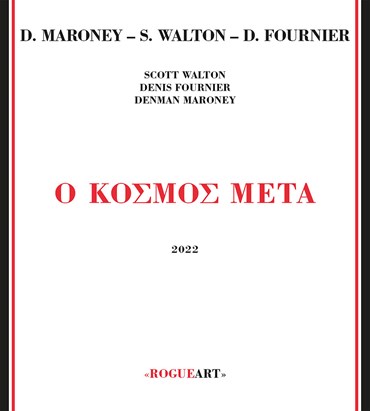
Denman Maroney / Scott Walton / Denis Fournier - O Kozmoz Meta
Rogue Art, 2022
Deman Maroney, piano
Scott Walton, double bass
Denis Fournier, drums
Recorded in June of 2021, during the Great Pandemic, at Recall Studio in Gard, France. Since moving to France a few years ago, we haven’t heard much from Hyper-pianist (his term) Denman Maroney until now. This is a most impressive free-wheeling trio with no leader. Bassist Scott Walton is from L.A. and can be heard with various westcoasters: Vinny Golia, Alex Cline, Cosmologic & Nathan Hubbard. French drummer Denis Fournier has recorded with Nicole Mitchell in a group called Watershed, as well as with Denman Maroney in duo, whose one recording, ‘Intimations’, I had never seen or heard of. I am a longtime fan & friend of Mr. Maroney, whose unique Hyper-piano playing is in a class of its own and who has worked with a number of Downtown’s finest players: Mark Dresser, Ned Rothenberg, Earl Howard and Sarah Weaver.
Denman Maroney’s distinctive muted notes inside the piano with a unique piece of metal is the first sound we hear, quite eerie and haunting and is soon joined by Mr. Walton’s suspense-filled bowed bass and Mr. Fournier’s subtle cymbal work. The trio play slowly and cautiously, making every note/sound count. Mr. Fournier’s plays with his hands on the drums for “KM #2” establishing a sly groove, while Maroney coaxes some strange sounds from inside the piano while Walton creates the cosmic throb with his contrabass. When the tempo picks up on “KM #3”, the trio starts to levitate together with Maroney spinning out those odd muted notes in a whirlwind fashion. Maroney creates a series of drones throughout this disc which seem to be forever expanding and contracting , the overall effect is both hypnotic and somewhat disorienting. Drummer Fournier sounds like the perfect collaborator for the rest of the trio blending rhythmic elements with equally eerie sonic weirdness as well. I can’t quite think of any other trio that this one sounds like although The Necks use some similar sonic effects but are often held down by a perpetual pulse. When I listened to this disc for the second time late at night a bit stoned, the vibe was even more effective and transformative.
- Bruce Lee Gallanter, DMG
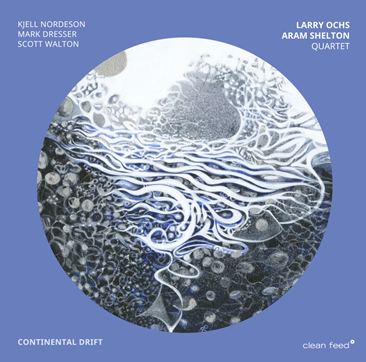
Larry Ochs/Aram Shelton Quartet: Continental
Clean Feed, 2020
Larry Ochs - tenor saxophone, sopranino saxophone
Aram Shelton - alto saxophone
Mark Dresser - acoustic bass (tracks: 1 to 3, 5 to 7)
Scott Walton - acoustic bass (tracks: 4, 8)
Kjell Nordeson - drums
"Can musicians of different generations be like-minded companions? Yes they can, at least when their names are Larry Ochs and Aram Shelton, the two composers and bandleaders of this quartet. As they themselves acknowledge, Continental Drift is a kinetic meeting of sorts, with compositions that are designed to inspire magnificent contributions from the entire team of players, both individually and collectively. The resulting music profits greatly from each members' individual capacities and personalities.
Ochs and Shelton's musical backgrounds are both quite varied, evidenced by their own separate pasts exploring the worlds of jazz, contemporary classical, electroacoustic and "other" music. More than that, both have been important voices of the San Francisco Bay Area improvised music scene: Ochs being a cutting-edge Bay Area improviser since the 1970's, while Shelton, now living in Europe, is also known for his connections to the very different Chicago scene. Each plays in his own way, but they share the same principles and look for very similar results - together creating new music with a jazz approach and an avant-garde attitude, not alienated from history.”
- Clean Feed
...“This is an interesting blend of musicians from alternating scenes working together, a double sax-led quartet with one of two different bassists on each date, the sessions recorded five years apart. The older session (recorded in July of 2013) featured Mark Dresser on bass while the other session (from July of 2018) has Scott Walton on bass. Both frontline saxists contributed four pieces each. Although originally from Florida, alto saxist, Aram Shelton, moved to Chicago, becoming an integral part of that scene before moving to Oakland, CA, where he still resides. Larry Ochs, who is a longtime member of the Rova Sax Quartet, has had several of his own bands through the many years, always choosing his collaborators wisely.
Commencing with Shelton’s “Another Night”, the quartet lays back and simmers while both saxists take dreamy, laid back solos on alto (sic - tenor) and then sopranino saxes (sic - alto), building nicely but not erupting too intensely until the last section. I love Shelton’s piece, “Switch”, which has one of those sort-of South African-like melodies which I find most invigorating plus inspired solos from both saxists. Both rhythm teams here, no matter which musician is playing the bass, sounds great at playing this material. On the title track, things slow down for some great, suspense-filled sections, sublime flute and sax softly intertwine and brings us quietly back down to Mother Earth. The secret weapon here is the distinctive & powerful bass-work on Mark Dresser, throbbing at the center of the storm on several pieces. The final piece, “The Others Dream” is long (nearly 20 minutes) and covers alot of ground. Bassist Scott Walton gets a chance to stretch out here and also sounds great during his solo. This piece is episodic with different connected sections and several strong sax solos at different points.
This disc is one of the best efforts we’ve heard from Clean Feed recently.”
- Bruce Lee Gallanter, DMG
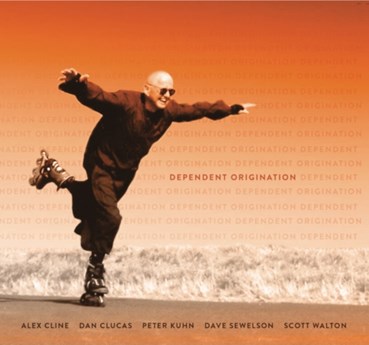
Peter Kuhn, Alex Cline, Dave Sewlson, Scott Walton, Dan Clucas
Dependent Origination
fmr-records, 2017
Peter Kuhn - Bb and bass clarinet, tenor saxophone
Dave Sewelson - baritone and sopranino saxophone
Dan Clucas – cornet
Scott Walton – bass
Alex Cline – drums and percussion
L’originazione dipendente è uno dei capisaldi del buddismo. Esprime la legge della causalità per cui tutto dipende da circostanze precedenti e dalle interrelazioni con tutto il resto. Il quintetto formato da musicisti di grande qualità come Peter Kuhn (ance), Alex Cline (percussioni), Dave Sewlson (sassofoni), Scott Walton (basso) e Dan Clucas (tromba e flauto) performa musicalmente il concetto in questo album realizzato dal vivo in California nel 2016. Le tre tracce (la lunga Aspiration, The Nibbler e The Way Out (Is In)) riproducono altrettante riuscite improvvisazioni libere. Muovendosi fra il free jazz e la free improvisation contemporanea, ma accogliendo anche influssi da tradizioni diverse (il kletzmer per esempio), il quintetto riesce a tenere sempre alta la tensione e intensa la fluidità dell’interplay. Momenti molto ritmici – quasi funky-soul come la parte centrale di Aspiration – si alternano a estesi episodi di sospensione, dialogo tra solisti, o estasi collettiva. E molto varia è la tavolozza espressiva (anche se domina, mi pare, un certo senso per una partecipata ironia e un sorridente senso di gioia). Convince, nel complesso, l’esibita accettazione del fatto che il senso di quanto fa il singolo dipende da quanto fanno gli altri e che ciò che fa il gruppo è l’esito dell’incontro tra diverse tradizioni e concezioni musicali profondamente assimilate e fatte proprie dai musicisti.
Voto: 9 - Alessandro Bertinetto
English translation:
Dependent origination is one of the cornerstones of Buddhism. It expresses the law of causality according to which everything depends on previous circumstances and on the interrelationships with everything else. This quintet of exceptional musicians, Peter Kuhn (reeds), Alex Cline (percussion), Dave Sewlson (saxophones), Scott Walton (bass) and Dan Clucas (trumpet and flute) musically perform the concept in this live album in California in 2016. The three tracks (the long Aspiration, The Nibbler and The Way Out (Is In)) are free improvisations. Moving between free jazz and contemporary free improvisation, but also welcoming influences from different traditions (klezmer for example), the quintet always manages to keep the tension high and the fluidity of the interplay intense. Very rhythmic moments – almost funky-soul like the central part of Aspiration – alternate with extended episodes of suspension, dialogue, or collective ecstasy. And the expressive palette is quite varied, though it seems to me that a certain sense of shared irony and a smiling sense of joy dominate.
Convincing, overall, is the exhibited acceptance of the fact that the meaning of what the individual does depends on what others do, and that what the group does is the outcome of the meeting of different musical traditions and conceptions deeply assimilated and made their own by the musicians.
Alessandro Bertinetto - Kathodik
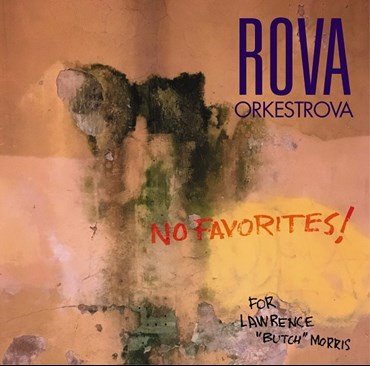
Rova Orkestrova: No Favorites !
New World, 2016
Tara Flandeau - viola
Christina Stanley - violon
Alex Kelly - cello
Scott Walton - acoustic bass
John Shiurba - electric guitar
Jason Hoppes - electric bass
Jordan Glenn - drums
Rova:
Bruce Ackley - soprano saxophone
Steve Adams - alto saxophone
Larry Ochs - saxophone tenor
Jon Raskine - baritone saxophone
Gino Robair - direction
Rova and the 2015 version of OrkestRova recorded a CD’s worth of music at Fantasy Studios in Berkeley on July 1, two days after a fantastic concert in San Francisco. Orkestrova 2015 – a power trio, string quartet and Rova, all playing together – recorded three long pieces, dedicating the CD to Butch Morris; a shout-out to the spirit of his life’s work in conduction; his term for the combination of conducting, cueing and improvisation. All three extended compositions include formal structures devised by Rova members, as well as of various kinds of improvisation; visual cues influence the sounds and the arc of the music.
Rova’s work here is more than a tribute to Morris’s techniques and accomplishments, resonating as well with the history of large-ensemble improvisation and a genuine need to transcend musical categories and discourses. The joy and power of this music develops directly from its combination of complexity and openness, its complexity in part a condition of its openness to other musics and ideas. The inclusivist vision (shared by Morris with his claim to “No Favorites”) has expanded to the present work in which a class structure of genres has largely disappeared and in which instruments and ensembles are no longer segregated. Further, this music creates remarkable balances between the needs of all the communities involved, whether groups (of groups and individuals), whether musicians, conductors or audience, balancing impulses with constraints, aligning methodologies with results and creating a kind of continuous participatory democracy.
- Stuart Broomer, Anthology of Recorded Music
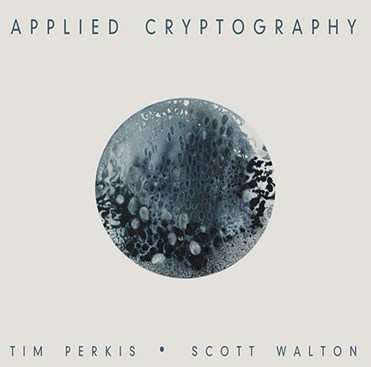
Tim Perkis/Scott Walton: Applied Cryptography
pfMENTUM 2016
Tim Perks - electronics
Scott Walton - piano
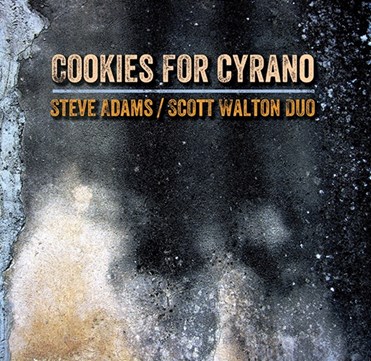
Steve Adams/Scott Walton: Cookies for Cyrano
pfMENTUM 2016
Steve Adams - alto saxophone, baritone saxophone, flute/bass flute, electronics
Scott Walton - acoustic bass
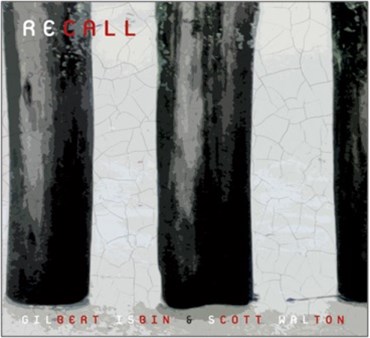
Gilbert Isbin & Scott Walton - Recall
pfMENTUM, 2012
Gilbert Isbin - lute
Scott Walton - acoustic bass
Check out some audio and video clips of the Isbin/Walton Duo at: http://www.gilbertisbin.com
Recall displays a wonderful interweaving of strings Melodically, emotionally, this is music is far beyond any kind of boundary. The interaction between the two reveals an open curiosity and mutual respect. The fifteen tracks (including an arrangement of a medieval song), sound nothing short of brilliant revealing melodic lush expanses and tangles, virtuosic, pure and raw, with a an evocative power out of the ordinary. Instant wonderful compositions exposing the ancient and the contemporary, and a refined research. A beautiful collection, hypnotic, warm and caressing. At times stunning, in its apparent simplicity.
- Marco Carcasi, Kathodik
Lute and bass from a brand new duo with interesting shades of timbre balancing between avant-garde jazz and Renaissance sources. The timbre of Isbin’s inventions recreates the instrumental practice of the lute with jazz rhythms that are sometimes closer to a guitar. The warm tone of this plucked instrument resonates with the low bass of Walton, played like a cello with airy heterogenous textures. A disc that reveals new developments, recommended for those who are not satisfied with the ordinary.
- Maurizio Zerbo, All About Jazz
There are only two players here, two instruments, lute and bass, and no overdubs, but the sound is so complete, even when arid and windblown, that one marvels at the fabrics, the bizarre, serene, loquacious, and peripatetic entablatures complete in warp and woof, needing nothing more than precisely what's been evoked. Like a Miro painting, a sumi brushstroke, or a petroglyph kiva panel, the frequently austere figurations speak for themselves and as fully as a Monet canvas or a Dalinian hallucination. Walton's astonishing in the range he can coax or force out of his instrument, re-fleshing Brian Eno's observation that many instruments are far too inadequately explored. Isbin has listened deeply to every era and epoch in the sonic arts and missed nothing, resulting in a constant defiance of time and place. The combination, then, of two such broad ranges in hands almost too outré to credit as being human has here resulted in a disc that nearly climbs out of itself, and, 100 years from now, Recall and kindred expositions will be attended as though they were wrought the day before and still marveled at.
- Mark S. Tucker, Folk & Acoustic Music Exchange
The disc contains a series of short compositions and improvisations. Although much of the material is thematically linked, each piece begins to feel like its own short story. Interplay is emphasized here with both performers skillfully maneuvering between composed sections and more freely improvised passages. This is evident on the track Pensive, with Isbin laying down a harmonic foundation for Walton’s extended bowing techniques. The result is akin to a short piece by Morton Feldman. Timbre is important throughout the set and delicate unison passages can often give way to more turbulent textures. Flutter is a good example of this, with the duo settling into a groove before evolving naturally into a section of free improvisation. This configuration allows for a great deal of space in the music that each performer seems comfortable exploring. Overall, this is a very engaging set from two creative musicians.
- Daniel Moore, The Whole Note
Gilbert Isbin and Scott Walton give us that most rare of duo combinations, and a whole disk's worth at that: the meeting of lute and contrabass. Recall (pfMentum 073) is the title, and it has resonance, since there is a deja vu quality to the music. Isbin is at the lute, Walton on the bass. Together they traverse a sort of free/composed territory that combines avant improv with echoes of early music lute sounds. It's a magical combination and a provocative, very well played program. Both are impressive exponents of their instruments and they work together closely and quite productively. It's a CD you might not expect. Once you hear it a few times it starts getting to you in nice ways. There may be nothing else like it out there. Happy listening!
- Grego Applegate Edward, Gapplegate
With their new CD, Gilbert Isbin and Scott Walton inaugurate a new genre for lute and bass. In their music we find references to contemporary classical music, to Renaissance music and jazz. Recall combines original Isbin compositions with duo improvisations that take the listeners to soundscapes marked by emotional subtlety, a touching melodicism and (for an acoustic duo) an astonishing variety of timbres and textures.
- Pascale Boquet, Le joueur du Luth
Gilbert Isbin first came to our attention over 10 years ago with his spellbinding arrangements of a collection of Nick Drake songs. Gilbert has in the past few years turned to the lute to great effect. He has always been a musician who loves to experiment and create music that is on the boundary and definitely from the left side of the field. He uses the lute in a thoroughly modern way, creating sonic landscapes that are truly original and avant-garde in the best sense of the phrase. His collaborations with the virtuoso contrabass player, Scott Walton, are astounding and something fresh, new and totally out there on the musical horizon. Check out their latest CD Recall – definitely not your average musical offerings. Recall a feast of unusual and harmonically startling flavors.
- Steve Elliott, AGW
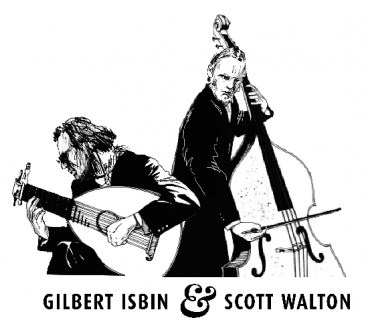
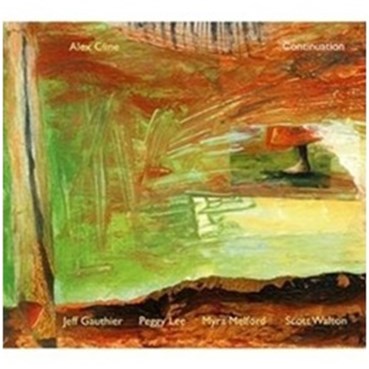
Alex Cline - Continuation
Cryptogramophone, 2009
Alex Cline - percussion, kantele
Jeff Gauthier - violin
Peggy Lee - cello
Myra Melford - piano, harmonium
Scott Walton – acoustic bass
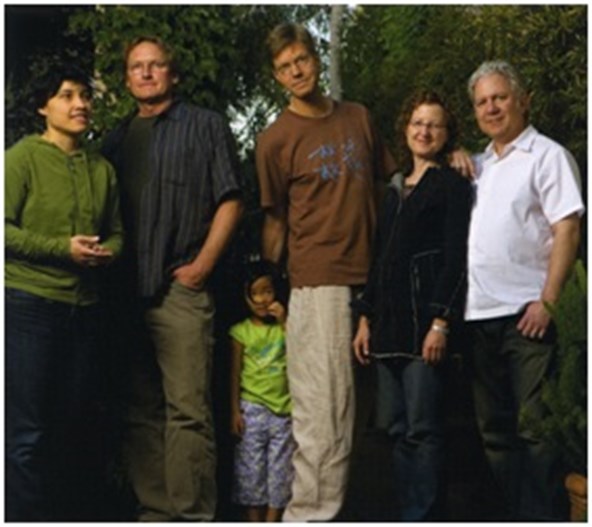
© Anne Fishbein
Joined by acquaintances old and new, Cline employs a stellar line-up of West Coast players to interpret beautifully episodic compositions that seamlessly fuse intuitive improvisation with harmonically rich pre-written structures, while occasionally pushing into more assertive territory. His string-heavy quintet weaves a nuanced web of sound that erases the boundaries between Western neo-classicism and Eastern modality. Jeff Gauthier's searing violin solo on Steadfast, the sonorous refrains of Peggy Lee's mellifluous cello on Nourishing Our Roots, and Scott Walton's lyrical bass cadenza introduction to Clearing Our Streams embrace myriad traditions, conveying a range of emotion. Collectively, they reveal a tight-knit rapport, summoning brooding polyphonic tendrils and rapturous unison motifs. Straddling an aesthetic divide between the lush sonority of the strings and the leader's percussive asides, keyboardist Myra Melford plays a multifaceted role - from pneumatic clusters and thorny cascades, to tender, romantic pageantry, her resourcefulness is immeasurable. More interested in orchestral color and shading than standard timekeeping, Cline elicits a kaleidoscopic array of tones from his augmented drum kit, ably supported by Walton's hearty pizzicato ostinatos and robust arco glissandos. Populated by lengthy epics, the album unveils its secrets leisurely. Spacious and ethereal, brimming with opulent melodies, effervescent harmonies and bold polyphonic detours, Continuation is a magnificently balanced merger of composition and improvisation that reaches beyond cultural barriers, into a fourth world of its own design.
– Troy Collins, All About Jazz
This is master-percussionist and composer, Alex Cline's eighth disc as a leader, and as hard as it may seem, his discs continue to get better as his musical palette expands. Continuation is filled with a number of lengthy cinematic scenes and stories, something that Cline has long excelled at. Nourishing Our Roots opens our journey - an elegant aura of precious and lovely sounds, with a splendid cushion of acoustic bass and flowing drums underneath. Bassist Scott Walton starts off Clearing Our Streams and is at the center of many of these pieces. His playing consistently shines and he is often at the heart of this session - Alex has picked the perfect partner for this entire disc. Cline's mysterious percussion is featured on Fade to Green with some exquisite piano and cello. The sound of the percussion is stunning. The two long pieces here are 18 minutes each and they evolve slowly with fascinating results. SubMerge features a superb blend of bowed strings, violin, cello and bass, with harmonium and haunting percussion producing a trance-like state. On the Bones of the Homegoing Thunder continues the mesmerizing vibes with some smoking, swinging jazz sections. Alex Cline's Continuation is without a doubt one of great discs of this or any year.
- Bruce Lee Gallanter, Downtown Music Gallery
The Alex Cline Ensemble, combining measured spontaneity with long-form writing, in its near-classical approach to compositional development, is a unique confluence of form and freedom. Nourishing Our Roots is a gentle opener, an ethereal tone poem that features Walton's visceral tone, before Gauthier and Lee come together in unison over the rubato foundation of their band-mates. Clearing Out Our Streams, in contrast, swings in surprisingly Elvin Jones fashion after Walton's opening solo, turning into an Eastern-tinged modal workout for Melford's harmonium. The abstract Fade to Green also uses space as a silent partner – a Feldman-like piano pattern deceptively simple, creating a base for more abstruse improvisation from her band mates. Cline's interest in Oriental spirituality remains intact on this recording but the disc is still—despite its often calming, meditative vibe—the hardest-hitting album of his career. If Continuation is any indication, this is a new group that Cline needs to hang onto. Quite possibly the group he's been searching for all his life to best interpret his multifaceted, multi-stylistic and multicultural interests.
- John Kelman, All About Jazz
Alex Cline is one of the few musicians who can triumph over his own calm and discipline to make involving music. His meditations are revolving worlds of color and vibration, places you can fall into and keep tumbling till you get dizzy, lose yourself, merge. Most of the album has an open, varitextured feel, exemplified in different ways by the two 18-minute compositions that weight the second half. SubMerge, with its extremely spacious gamelan-like palette, harbors a lot of drama: little bell cymbals that vibrate your sinuses, blossoming gongs, Tarkovskyan expanding nebulae, hiatuses terminated with heavy concussions. Sudden pauses also punctuate On the Bones of the Homegoing Thunder (a Thomas Merton line) after it permits itself a Cecil Taylorish introductory hustle with Melford on piano and a bowed Walton solo as rich and thick as a mound of molé; its eerie cat-paw piano, bass walk and violin drone make for a really original, inward-drawing end. Wondrous as these are, I dig the groove numbers most. The sliding bass and wheezing harmonium of Clearing Our Streams carry a whiff of India as Alex builds a fat, dark rhythm on the low toms and the strings intertwine in a DNA dance. Cline doesn’t just let you hear the essence of an instrument or a tone or spirit visitation, he MAKES you hear them.
- Greg Burk, MetalJazz.com
Alex Cline's percussion armada of drums, cymbals, and little instruments has likely not been showcased as well as on Continuation, a set of free-based, contemplative, and harmonically rich works made for his heroes, mentors, and recently deceased friends. Between what Cline is able to conjure from several different sonic aspects, his able bandmates give full account of themselves in their attempt to fully fashion his music in percussive and melodic means. The always exceptional individualist Myra Melford has a seemingly separate role, forcefully willing her way into advancing the compositions more rhythmically than Cline. Cellist Peggy Lee, violinist Jeff Gauthier, and bassist Scott Walton all have similar stances in bowing their instruments to soaring heights, but make a more melancholic music that speaks directly to the art of continuation, and how it manifests renewed life. What is most noticeable is the insular restlessness of the group in that they steer clear of clichés, straight time, or thematic motifs, moving on to the next-next phase with regularity. Continuation is a fully realized artistic statement, highly recommended to those who are open to all aspects of future musical visions.
- Michael G. Nastos, All Music Guide
Alex Cline’s seven compositions defy any specific genre or style. Instead, they offer an inventive fluidity, a humane grace, and the intimations of a wider perspective that expands into a kind of universal limitlessness. In the opening and closing chapters, Nourishing Our Roots and Open Hands, Jeff Gauthier’s delicate violin, Peggy Lee’s resonant cello, Cline’s abiding percussion and Scott Walton’s intimate bass flow seamlessly as one. Clearing Our Streams starts with Walton’s solo bass, his arco work affording the tune’s melodic onset. Cline enters later, subtly but invitingly adding a swinging counterpoint, followed by the strings, and finally harmonium weaves in and forms a three-dimensional solo expanse, and moderately but firmly the musicians breath fire into the piece, moving from percolation to a faster pace with resolute textures. Fade to Green is thoughtful but not necessarily tranquil. There’s a feeling of foreboding, tension, and mystery that permeates the unhurried, ambient arrangement. Cline’s multiple percussion effects furnish an unsettling sweep echoed by the plucked and bowed strings and pointillistic piano. It is beautiful but discretely apprehensive, like finding decay beneath a flowerbed. On the Bones of the Homegoing Thunder is an epic tone poem that surveys several genres at once. First, there’s a propulsive jazz section - Myra Melford demonstrates her resourceful and expressive sensibility. Elsewhere, Cline’s percussion pulses underneath exotic, appeased moments, but like other unrestricted dramatic scores, there is a shift from austerity to intensity as the instruments build inexorably to a flash point.
- Doug Simpson, Audiophile Audition
Anchored by two 18-minute pieces and filled with atmospheric resonance and meditative movements, Continuation is not a listening experience that can be rushed, but what a satisfying and varied journey Alex Cline and his four collaborators take you on. Just when you get comfortable with the long, acidic tones from Jeff Gauthier's violin and Peggy Lee's cello on On The Bones of the Homegoing Thunder, the piece explodes with the entrance of a hard-swinging piano trio, with Myra Melford whipping around the keyboard with tight flurries of notes and Cline and bassist Scott Walton riding madly behind her. The composition continues to unfold in stages, raising and lowering the temperature as it goes. Melford grabs your ear time and again, whether with minimalist piano, rhapsodic soloing, or through the effective use of her harmonium as an additional textural element and as an evocative melodic lead on Clearing Our Streams. Moving from dramatic solo bass to an ancient-sounding anthemic ensemble, that composition best defines Cline's sense of evocative mood setting.
- James Hale, Downbeat
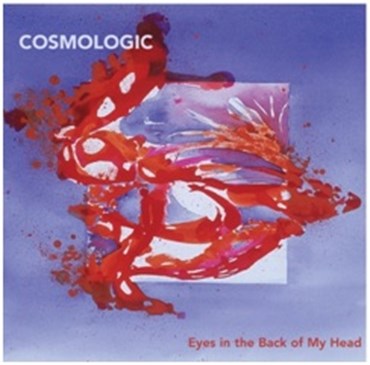
Cosmologic - Eyes In The Back Of My Head
Cuneiform, 2008
Jason Robinson - tenor saxophone
Michael Dessen - trombone
Scott Walton - acoustic bass
Nathan Hubbard – percussion
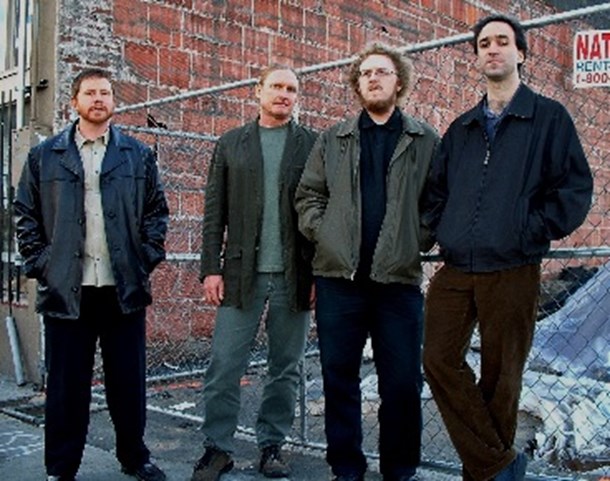
Over the ten years Cosmologic has existed, they've learned not only how to play high level original contemporary improvised music, but have attained a unique style few stable or working groups have attained.... The fearless attitude that this group exhibits in taking chances, yet remaining quite listenable, is a rare thing. Another aspect of Cosmologic is that they can play to younger audiences in the midst of discovery, while also appealing to the 50s-and-older set that craves both the "new wave" of the ‘60s and an updated non-electronic sound. Bravo to Cosmologic for making no compromises, playing some truly fascinating upper echelon progressive jazz music.
- Michael Nastos, All Music Guide
Free jazz upstarts from San Diego strike a balance between complex form and forceful abandon on their fourth outing.... Thoughtful writing and bold instincts make this a compelling listen.
- Bill Milkowski, Jazz Times
While the group's strongest antecedents are in free jazz, the composerly emphasis gives it a distinctive character, the pieces often favoring punchy ensembles, contrasting them with unusual moods and textures, including extended techniques.... The band's handling of these compositions is anything but static, making use of turbulent collective improvisations and intensive free blowing in order to both explore and break through the primary moods. It's well-designed and well-executed music that opens in a variety of directions.
- Stuart Broomer, Signal To Noise
In today's world of all-star studio sessions and endless collaborative side-projects, longstanding working bands are growing increasingly uncommon. Cosmologic is a splendid example of such a rarefied entity.... Eyes In The Back Of My Head is a richly rewarding statement from a group whose time for greater exposure is long overdue. Accessible yet forward thinking, this is contemporary West Coast jazz at its most heartfelt and adventurous.
- Troy Collins, All About Jazz
They have been together for almost 10 years... That experience together shows in the extra-fine post-Bop they play so well. These are all originals... and there are many fine duets and ensemble passages here, as Cosmologic seems to be about the group and not the soloists. This doesn't mean there aren't strong solos.... [but] it is their great group sound and cohesiveness that recommends Cosmologic.
- Phillip McNally, Cadence
[Cosmologic's] perspicacity and ability to capture the unusual gives their music a rather exceptional focus.... Cosmologic does not let the written note be the guiding light. Their sense of juxtaposition dictates the course. Flow and chaos are consonants in constant flight that are navigated by surprise, and the band documents this consummately, making Eyes In The Back Of My Head a stirring listening experience.
- Jerry D'Souza, All About Jazz
Does Cosmologic qualify as an avant-garde jazz ensemble? Not if you regard the genre as a refuge for self-indulgent musicians with a shared taste for cacophony. For all the improvised and willfully discordant music this 10-year old West Coast quartet is capable of producing, and reveling in, Cosmologic produces a sound so rich in mood-shifting maneuvers and sophisticated interplay that it defies labeling. Eyes in the Back of My Head, the band's latest offering, is intriguing enough to keep you guessing from start to finish.... In the end, the album, composed entirely of original music, says as much about Cosmologic's discipline and cohesiveness as it does about its freewheeling spirit.
- Mike Joyce, Washington Post
Extra Special Good: This jazz foursome are still together after more than a decade in a town that kind of ignores them, even though they consistently make some of the most vital and exciting music around. Abundant skills, ethereal communication, wild flights of chaos and sustained moments of fleeting beauty comprise this work of art that takes cues from the approach most often known as free jazz.
- D.A. Kolodenko, CityBeat San Diego
The musicians mold a singular mindset, which is a component that radiates throughout this starkly inventive and superfine progressive-jazz statement. As a tight-knit and largely expressive unit, they come at you from all angles. It’s a highly-disciplined group, where they also specialize in loose-groove like expansions. Sparked by youthful vigor and a continual reengineering methodology, they fuse unorthodox time signatures with spirited soloing jaunts into the grand schema.... No doubt, this is a band for the new age of jazz. Their charismatic and rather impudent mode of delivery bears the mark of distinction. (Heartily recommended!)
- Glenn Astarita, JazzReview.com
Over the past decade, street-savvy, hard-hitting urban quartet Cosmologic has built it's high-impact, low-comfort-zone approach to groupwork that recalls Anthony Braxton's small-band intelligence and The Fringe's raw energy. The California-based band enjoys bumpy textures, aggressive stances, loose-wheeled (if not off-track) soloing and equal voices for horn and rhythm players...
- Fred Bouchard, All About Jazz New York
There are groups that, despite playing materials whose roots are firmly planted in the grounds of definite genres, defy an easy tagging due to a multiplicity of motives.... Cosmologic... is precisely one of those units. [Eyes In The Back of My Head] positively stands on a jazz pedestal yet the junctures in which they don’t sound like that are countless, the exploitation of a vastly proficient improvisational sagacity shifting the solidity of the interplay more towards a coordinated kind of self-government than run-of-the-mill structures, with allowances to vamp-based vigorous drive.... A methodologically prominent record, indubitably rewarding for educated ears.
- Massimo Ricci, Touching Extremes
Eyes in the Back of My Head is a densely rich album that focuses on the idea of exuberance from its opening.... The compositions of Cosmologic exhibit a rare maturity that re-gild the emblem of a modern jazz that, each day, searches to redefine itself.
- Guts Of Darkness
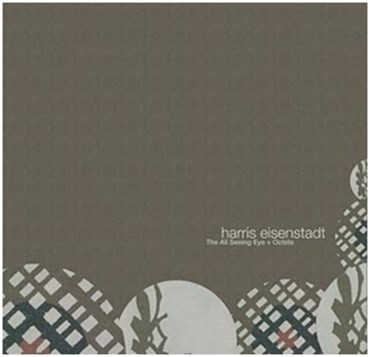
Harris Eisenstadt - The All Seeing Eye
Poo-Bah, 2007
Harris Eisenstadt - drums
Daniel Rosenboom - trumpet
Aaron Smith - trumpet
Sara Schoenbeck - bassoon
Brian Walsh - clarinet, bass clarinet
Andrew Pask - clarinet, bass clarinet
Chris Dingman - vibraphone
Scott Walton - acoustic bass
Marc Lowenstein - conductor
Percussionist Harris Eisenstadt demonstrates historical savvy and versatility - his aim is two-fold: he re-interprets Wayne Shorter’s Blue Note classic, but two of his own larger compositions are also presented in beautifully transparent arrangements that crackle with energy, even in moments of near silence. The title track’s opening staggered counterpoint and chords shine brightly due to the more wind-heavy orchestration, extremes in register in stark relief demonstrating Shorter’s now legendary penchant for melodic writing. Similarly, the passage of time has allowed for the dissonances in Mephistopheles to be integrated into the more general musical vocabulary, and they are beautifully executed here, with Scott Walton’s acoustic bass heavy and sinister below. Walton emerges as a hero of sorts throughout; his precise underpinnings infuse the opening movement of Without Roots, the first of two larger Eisenstadt suites presented here. The movement is an astonishing steady in articulation, slow-fading colors and blurred lines emerging into a pointilistic dialogue, concentric sonorities giving way to shards and fragments of themselves. Muted trumpet, bassoon and bass clarinet provide a degree of homogeneity while texture allows for constant change, Chris Dingman’s vibes with varying vibrato speed covering much of the music with a metallic sheen. The fusion of 20th century classical and “jazz” gestalts is so complete that when the transition finally occurs, some way into the second movement, its naturalness is beguiling. This is a bold statement from a fine composer and a first-rate assemblage of players.
- Marc Medwin, Dusted
A brazen re-interpretation of Wayne Shorter's brooding masterpiece, The All Seeing Eye (Blue Note, 1965), Eisenstadt re-imagines the album's simmering drama as a roiling chamber music recital. Ambitious in scope, Eisenstadt bolsters the classic album with two long-form original suites that blend neo-classical intricacy with the emotional immediacy of free jazz and folk forms.
Altering the timbre and tone of the original 1965 session by re-organizing the instrumental palette, Eisenstadt employs a richly hued woodwind trio in lieu of Shorter's low brass and saxophones. The plangent bassoon of Sara Schoenbeck mingles with the caterwauling clarinets of Andrew Plask and Brian Walsh as they soar where the original line-up churned, blending fervent expressionism with lyrical precision. Eisenstadt adds lift to the ensemble by replacing the traditional chordal safety net of the piano with the spare airiness of Chris Dingman's kaleidoscopic vibraphone. Interwoven with the lyrical refrains of Daniel Rosenbloom's trumpet, they cast a brilliant metallic sheen over to the octet's resonant, woody timbre. With graceful fluidity, bassist Scott Walton and the leader maintain the pacing of the original album, driving the octet through brisk tempos and dreamy ballads. Shorter's ominous harmonies and driving rhythms provide poignant contrast to Eisenstadt's long-form suites. Avoiding typical Third Stream pitfalls, the octet eschews the studiously cerebral for the lyrically direct. Blending melodic kernels of euphonious depth with intricate counterpoint and dense harmonic voicings, Eisenstadt's writing resonates with singular clarity. The All Seeing Eye + Octets presents a vision of the future cast through the lens of the past.
- Troy Collins, All About Jazz
An ambitious effort indeed, Harris Eisentadt renders a personalized spin on four tracks by sax legend Wayne Shorter, where complex charts, featuring chamber-like horns, swing vamps are augmented by notions of realism that is defined by musical wit. Along with a few cosmic meltdowns, intermittently executed within avant-garde and progressive jazz-like improvisation, the drummer throttles the rhythms with massive press rolls and buoyant grooves. Eisenstadt is at the top of his game here. In effect, his vision and fortitude shines glowingly.
- Glenn Astarita, JazzReview.com
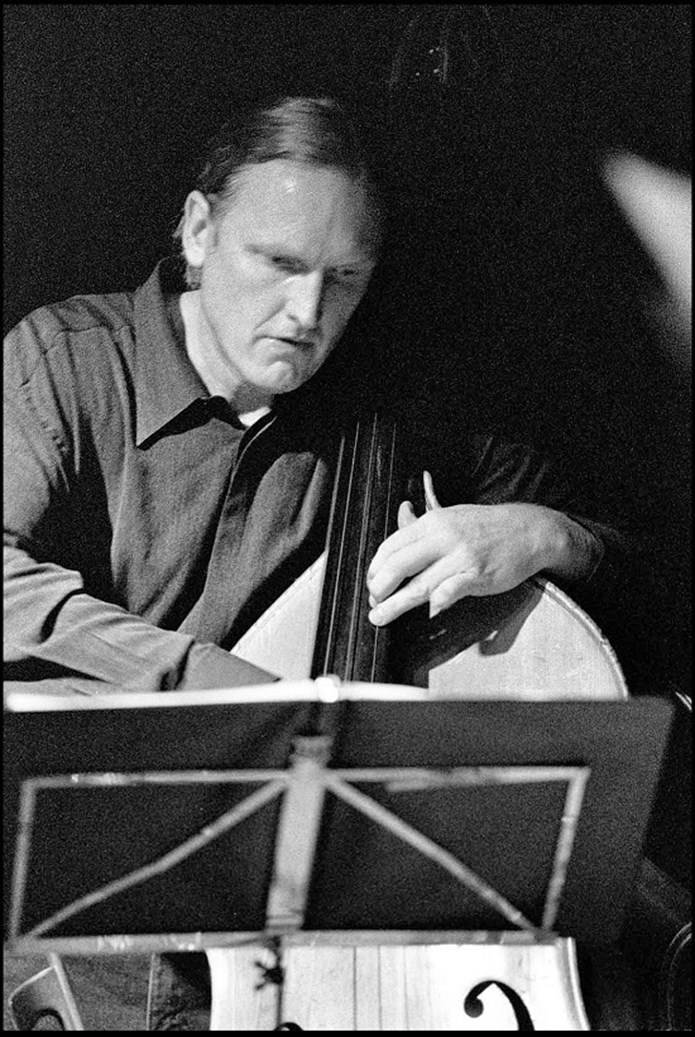
Brugge 2001 © Jos L. Knaepen
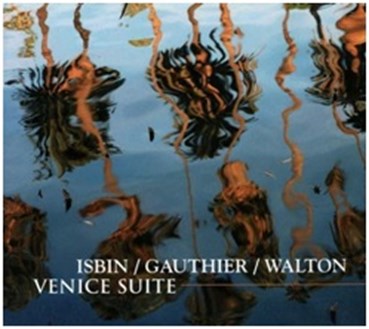
Isbin / Gauthier / Walton - Venice Suite
Jazz'halo, 2006
Gilbert Isbin - acoustic guitar
Jeff Gauthier - violin
Scott Walton - acoustic bass / piano
For the most recent release on the label Jazz'halo, Jos Demol brought together three musicians whom he admires greatly. Guitarist Gilbert Isbin, violinist Jeff Gauthier, and bassist/pianist Scott Walton. Venice Suite is one beautiful album. The three musicians understand each other completely, giving wonderful performances of Isbin’s compositions. Isbin has a beautiful sound, and Gauthier’s jazz and classical influences are evident. Walton has a solid, warm sound that gives body to the dreamy pieces. The music is extremely adventurous without ever looking or sounding too cerebral - the rendition of Nick Drake's River Man being perhaps the clearest example. The piece sounds simple, but is stunningly handsome, and is technically implemented with incredible impact. Charles Moffett once wrote a song Avant-Garde Got Soul Too. Venice Suite is proof.
- Mischa Andriessen, Jazzenzo
It's been a while since Jazz'halo released a new CD but it was worth waiting for with Venice Suite. As usual, this project is for connoisseurs. Gilbert Isbin (acoustic guitar), Jeff Gauthier (violin) and Scott Walton (upright bass, piano) present 16 pearls of musical finesse. There are a few open improvisations in the title track (with Walton on piano) and The Brugge Suite (a duet for violin and guitar). No special effects or abundant contours, just three highly professional musicians who play together under the motto 'back to basics' using mostly original material, (written by Isbin). As adventurous architects they create very personal patterns and forms. The blue and orange tinges of the cover reflect perfectly the feelings which this music evokes. Improvisational chamber jazz is the best description for this music.
- George Tonla-Briquet MazzMuzikaS
Gilbert Isbin’s compositions present a multitude of polyrhythms, bizarre sound effects, and colorful harmonies. Venice Suite is sentimental yet adventurously winding. It is chamber music of an extraordinarily honest kind somewhere between contemporary classical music and exceptionally creative jazz. I can only recommend it.
- Les, Improv.hu
A wonderfully enticing and genre-hopping studio date - there’s quite a bit going on under the proverbial hood. Gauthier combines the flair of a concert violinist with dense improvisational acumen to complement the musicians’ weaving of hypnotically melodic lines with richly textured themes. They often interrogate each other’s voicings while occasionally mixing it up within avant-garde like frontiers. On the piece titled Shine, the violinist executes a sweet melody atop Isbin and Walton’s bouncy undercurrents. Yet, the trio also injects moments of dissonance into the grand scenario where plots develop and ultimately morph into a regeneration of musical notions. Then on Why Was That, Isbin lays down a haunting ostinato as Walton subsequently stretches out with ascending lines. Finesse, discernible ingenuity and a highly entertaining form-factor are but a few of the attributes uttered throughout this unit’s musicality.”
- Glenn Astarita, eJazzNews
Gilbert Isbin’s trio with Americans Jeff Gauthier (violin) and Scott Walton (bass and piano) is exceptional. On Venice Suite they mostly perform his excellent compositions which are not easily pegged into one stylistic genre. It's not really jazz, certainly not modern classical, nor world music or rock, yet bits of these are evident. Sometimes the music is moody, modest, sometimes danceable, but always melodic, with a light melancholic undertone.
- Herman te Loo, JazzFlits
This new record from Jazz'halo includes interesting and inspiring acoustic music. The expression of the material is constrained in the sense that there are no long solo improvisations in the design - intelligent arrangements and authenticity of sound support the compositions. This is musical improvisation at its best, where the interaction between the musicians really works. In short, I find this a very fine record.
- Jussi Huolman, Jazzrytmit
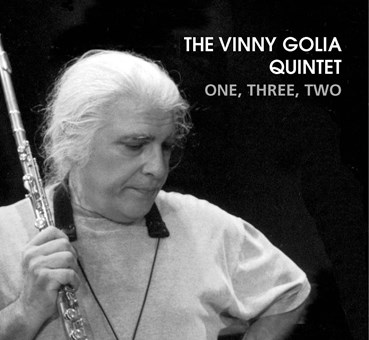
The Vinny Golia Quintet - One. Three, Two
Jazz'halo, 2004
Vinny Golia - piccolo, C & alto flutes, sopranino, soprano & tenor saxophones, A clarinet, ocarina
Michael Pierre Vlatkovich - trombone
Nels Cline - guitar
Scott Walton - acoustic bass
Alex Cline – drums
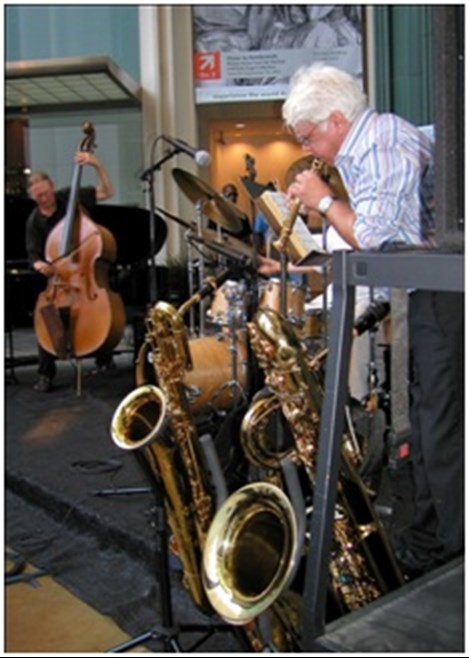
That Golia considers the quintet "...a comfortable platform to explore composition, improvisation and orchestration,” is testament to the broad range of colours that everyone in the ensemble is capable of—with Golia himself utilizing an array of flutes, saxophones, clarinet, and ocarina. Michael Pierre Vlatkovich, with a number of different mutes, coaxes a surprising wealth of textures and emotion from his trombone, from the oblique to the playful. Nels Cline combines the sonic coloration of a rock guitarist with a staggering wealth of musical knowledge—coalescing his diverse interests into a style that remains one of the most distinctive on any scene. Alex Cline exhibits the same almost limitless perspective, capable of dissolving into a maelstrom of chaos one moment and swinging hard the next. Bassist Scott Walton is equally adept at following Golia's sometimes idiosyncratic thematic constructs while locking into a barrelhouse groove. But it's the empathy that pervades these two sets that make them so special. The quintet seems to move effortlessly from intense interplay to more defined structure. Sometimes intense and serious, other times lithe and humorous, One, Three, Two is always imaginative, adventurous, and gripping. From a quintet that truly defines modern improvised jazz at its best, two sets of music that show how the worst possible events can stimulate passionate, meaningful responses.
- John Kelman, All About Jazz
This group takes you on a journey, not just in terms the lengthy, episodic, multi-part compositions on which they seem to thrive but in terms of their vast musical resources: each player has frightening instrumental command, able to shuttle between furious post-bop chops workouts and dazzling extended technique, usually several times during the course of one song. They come out of the gates, galloping hard, but can also dive deep into the murky waters of abstract, free time color and texture. It’s impossible to offer anything more than a general recommendation of this massive release, since the eleven tunes are so packed with slamming riffs, incendiary improvisations, and the like. Vlatkovich is such a raunchy player, hollering in gutbucket fashion but able to slip unexpectedly into fluid legato lines which slither between the complicated structures of Golia’s writing. Alex Cline is one of the really undersung players, gifted with a warm musical intelligence and a serious instinct for the groove as well; in this he’s joined by the fabulous Scott Walton, whose detailed but muscular work deserves study. Kudos go, not surprisingly, to Golia himself – who is such an amazing player, on any one of his myriad horns – and to guitar cosmonaut Nels Cline. Anyone who’s interested in hearing a state of the art quintet leap between genres, shatter rhythmic and harmonic boundaries, and exult in sheer, raucous improv fun that gooses both brain and heart, check this band out.
- Jason Bivins, Signal To Noise
During these two discs, you’ll hear foot stomping swing vamps shaded with soaring lines, amid free form improv and complexly woven time signatures - the musicians’ line of attack and deterministic intentions speak proverbial volumes.”
- Glenn Astarita, All About Jazz
One of the reasons this band works so well is its ability to tactically meld contrasting styles into a collective voice. Golia, on his usual arsenal of flutes, saxes, and clarinets, is a master of extended technique, timbral contrasts, and knotty angular lines. Vlatkovich's burly tone is a fitting foil, and he counters Golia with fleet runs shaped with broad smears and muted growls. Nels Cline seamlessly rides the edge, tossing off mercurial bop-phrased lines that can turn into distorted snarl or percussive abstraction. Alex Cline is just the sort of drummer you want for a group like this. He lets the time stretch to the edges of freedom while still managing to keep an open sense of momentum. Bassist Walton drives the music along with lines that buck and lunge with propulsive energy and melodic detail. The pieces bristle with charged, vibrant intensity. Let's hope this release on a small Belgian label gets the distribution and attention it deserves - it is one worth searching out.”
- Michael Rosenstein, OneFinalNote
O'Keefe / Stanyek / Walton / Whitehead - Tunnel
Circumvention, 2003
Pat O'Keefe - clarinet, bass clarinet
Jason Stanyek - fretless and quarter-tone guitars
Scott Walton - acoustic bass, piano
Glen Whitehead – trumpet
"tunnel,"
an ensemble music,
lyrical/expressic designed sonic fields
that are constructed with a continuous evolving
music.
acostica/eletronicl in a horizontal form
emotional, intellectual, experimental and philosophical
in nature.
music for your heart
from the heart.
Wadada Leo Smith
There's clarinet, guitar, piano and trumpet on this, but you almost wouldn't know it. You're in a factory at midnight as the janitor drags an oil drum across the cement floor. And it sounds beautiful.
- Greg Burke, LA Weekly
A richly rewarding disc that repays repeated listening."
- Andy Hamilton, The Wire
There are 7 tracks, alternating between shorter 4-5 minutes pieces and lengthier workouts, and all are improvised. Shorter tracks show the quartet at their most aggressive - Threshold features tortured screeching, scratched strings and intense sonic noise-rock textures matching wits with lighter whimsical horn and wind segments; and on Boundaries the musicians surprised me by cranking out a cacophonous, freaked out, punkish, space fest. Trace is a standout track that opens with slowly developing drones and atmospherics that have an avant-garde symphony hall quality, with the strings performing light dances and the clarinet and trumpet moaning and fluttering like a the howls of wind and wolves. I really felt at times like I was being swept across a harsh windswept landscape, and the lightest moments were often the most intense. We're talking major drones that vibrate in your skull while the clarinet, trumpet and piano are lulling you with a handful of notes that are low volume but intensely expressive statements. Measure is more sparse and even more subtly intense, developing steadily throughout it's 17 minute length. At times we get even deeper into experimental sound construction territory, with a variety of techniques used to wrench all sorts of sounds from the instruments. In summary, O'Keefe, Stanyek, Walton and Whitehead have created an absorbing set of improvisations that focus equally on atmosphere and thoughtful sound creation within a freeform and free flowing context."
- Jerry Kranitz, Aural Innovations
A strange and pacifying album, far closer to mood music than the instruments might obviously suggest. They take fairly conventional instruments and 'play with', as opposed to simply 'play', them. So rather than a contrived and laboured attempt at tacking 'more of the same' onto the world of Avant Garde, they manage to conceive and birth something original and innovative. One of the troubles with this sort of experimentation is that it can miss just as often than it can hit. Not here. Each of these journeys through the imagination seems to get every nuance of every moment just right. As often strange and challenging as it is warm and welcoming, the journey through this album passes some worrying dark places. Like a winding, dimly-lit corridor dotted with portal windows looking down into pits where Lovecraftian beings dwell, there often seems a mind-twisting danger staying just out of reach. There's a great resonance to this sound - the music, far from being a stereo representation of a room / box, manages to uncoil itself out of the very speakers in octopus-tentacles of bright sound. Hearing the limitless collage of sounds they seem to weave from mainly acoustic instruments, it just goes to show how lazy electronic musicians really are.
- Metajour
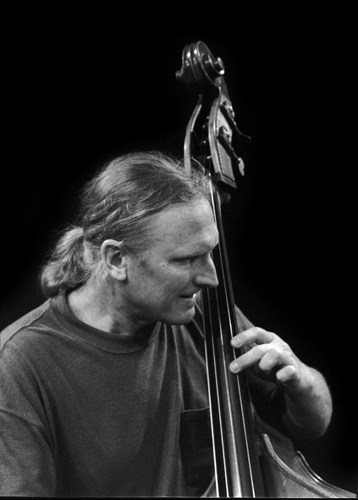
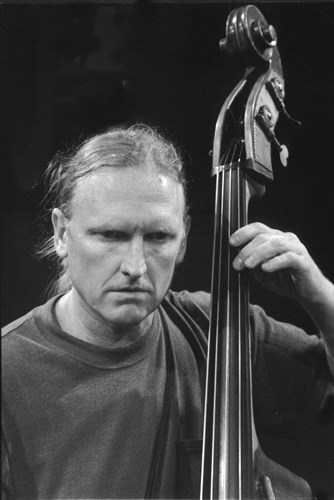
Brugge (B), September 15th, 2001 © Jacky Lepage
e-mail: scttwltn@gmail.com
In case you LIKE us, please click here:

Foto © Leentje Arnouts
"WAGON JAZZ"
cycle d’interviews réalisées
par Georges Tonla Briquet

our partners:



Hotel-Brasserie
Markt 2 - 8820 TORHOUT

Silvère Mansis
(10.9.1944 - 22.4.2018)
foto © Dirck Brysse

Rik Bevernage
(19.4.1954 - 6.3.2018)
foto © Stefe Jiroflée
Philippe Schoonbrood
(24.5.1957-30.5.2020)
foto © Dominique Houcmant

Claude Loxhay
(18/02/1947 – 02/11/2023)
foto © Marie Gilon

Pedro Soler
(08/06/1938 – 03/08/2024)
foto © Jacky Lepage
Special thanks to our photographers:
Petra Beckers
Ron Beenen
Annie Boedt
Klaas Boelen
Henning Bolte
Serge Braem
Cedric Craps
Luca A. d'Agostino
Christian Deblanc
Philippe De Cleen
Paul De Cloedt
Cindy De Kuyper
Koen Deleu
Ferdinand Dupuis-Panther
Anne Fishburn
Federico Garcia
Jeroen Goddemaer
Robert Hansenne
Serge Heimlich
Dominique Houcmant
Stefe Jiroflée
Herman Klaassen
Philippe Klein
Jos L. Knaepen
Tom Leentjes
Hugo Lefèvre
Jacky Lepage
Olivier Lestoquoit
Eric Malfait
Simas Martinonis
Nina Contini Melis
Anne Panther
France Paquay
Francesca Patella
Quentin Perot
Jean-Jacques Pussiau
Arnold Reyngoudt
Jean Schoubs
Willy Schuyten
Frank Tafuri
Jean-Pierre Tillaert
Tom Vanbesien
Jef Vandebroek
Geert Vandepoele
Guy Van de Poel
Cees van de Ven
Donata van de Ven
Harry van Kesteren
Geert Vanoverschelde
Roger Vantilt
Patrick Van Vlerken
Marie-Anne Ver Eecke
Karine Vergauwen
Frank Verlinden
Jan Vernieuwe
Anders Vranken
Didier Wagner
and to our writers:
Mischa Andriessen
Robin Arends
Marleen Arnouts
Werner Barth
José Bedeur
Henning Bolte
Erik Carrette
Danny De Bock
Denis Desassis
Pierre Dulieu
Ferdinand Dupuis-Panther
Federico Garcia
Paul Godderis
Stephen Godsall
Jean-Pierre Goffin
Claudy Jalet
Chris Joris
Bernard Lefèvre
Mathilde Löffler
Claude Loxhay
Ieva Pakalniškytė
Anne Panther
Etienne Payen
Quentin Perot
Jacques Prouvost
Renato Sclaunich
Yves « JB » Tassin
Herman te Loo
Eric Therer
Georges Tonla Briquet
Henri Vandenberghe
Peter Van De Vijvere
Iwein Van Malderen
Jan Van Stichel
Olivier Verhelst
